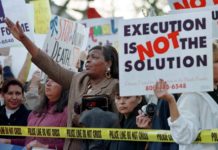by Tim Young

Some are opposed to the death penalty for religious reasons, because capital punishment doesn’t coincide with the tenants of their religion. In spite of what their true disposition may be, effort is made to follow the teachings of their faith. Nevertheless, under the right circumstances, some of them would be the first to judge, convict and condemn.
As poor and middle class Americans fight to survive the recession, opposition to the death penalty becomes more prevalent.
Some oppose the death penalty on moral grounds; they believe it to be barbaric and inhumane. However, there are some of them who have a qualm only with the state’s method of execution. To this end, they call for a more effective protocol, a more humane way of killing the condemned.
Those who are conscious and well informed tend to reject the death penalty on many levels. They know that the criminal justice system is racist, flawed, corrupt and unjust. For instance, when it comes to investigating and/or prosecuting a case, the state has access to unlimited resources. Public defenders fall on the other side of the spectrum; their budgets have never been carte blanche. Such disparities make it difficult for a criminal defendant to receive a fair trial. Due process should always be elevated when dealing with one’s very existence. If not, a guilty verdict doesn’t disprove actual innocence.
Now on to the economy. There are those who oppose the death penalty solely on economic grounds. A recent 2010 survey showed that support for the death penalty had dropped from 79 percent to 66 percent. Thus, as the economy crumbles, so does support for the death penalty. This may explain why the LA Times recently reported that “California’s capital punishment system has drawn widespread criticism as the most cost inefficient in the country, having executed only 13 people in more than 30 years.” This insinuates that the killing machine is not only too costly, but too idle! Life without the possibility of parole (LWOP) is now being (re)considered as a cheaper alternative.
It costs $49,300 to incarcerate one inmate for one year.
It costs $138,000 to incarcerate one death row inmate for one year.
There are currently about 700 prisoners on California’s death row. I am one
There are numerous inmates to vindicate. The prison system is littered with those who have been wrongfully convicted. To warehouse or execute even one is one too many! Give to them hope and liberty, not some empty alternative that only serves an economic purpose. To truly resolve the death penalty and a litany of other problems, injustice and inequality must hereby be abolished!
From death row, commentary by T. Young.
Send our brother some love and light: Tim Young, F-23374, San Quentin State Prison, San Quentin CA 94974.

 Store
Store












